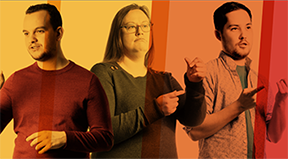
Abraham Glasser received his PhD in Computing and Information Studies. His dissertation, “Empirical Investigations and Dataset Collection for American Sign Language-Aware Personal Assistants.” Voice-controlled personal assistants are increasingly ubiquitous, and pose urgent accessibility challenges and barriers for DHH users. Dr. Glasser’s dissertation consisted of parallel research efforts investigating issues surrounding this technology, and provides a basis for future design and development of personal assistants that would be able to understand ASL input. Dr. Glasser started at Gallaudet University as an Assistant Professor this academic term.
Noella Kolash received her PhD in Computing and Information Studies. Her research interests focus on accessible and educational technology and human computer interaction for Deaf and Hard of Hearing. Currently, she works on improving accessibility for people who are deaf through the selection of culturally understandable icons. Dr. Kolash works as a Junior Full Stack Engineer with the National Technical Institute for the Deaf at RIT.
Matthew Seita received his Ph.D in Computer Science His research interests lie in accessibility and human-computer interaction and how Automatic Speech Recognition (ASR) can help deaf, hard of hearing and hearing people communicate better by designing ASR technology that will alert speakers that the software can’t pick them up clearly, which results in errors which lead to deaf people misunderstanding the communication exchange. Currently, Dr. Seita is doing a postdoc with Dr. Raja Kushalnagar at Gallaudet University.
Several other AccessComputing team members either completed their PhDs this year or will complete them before the new year:
Aisha Urooj received her PhD in computer science from the University of Central Florida. Her dissertation, “Visual Question Answering: Exploring Trade-offs Between Task Accuracy and Explainability” explores the process of answering questions about complex situations in videos; the process requires capturing the underlying semantics of actors, objects, and their relationships and their evolution over time (actions). Dr. Urooj examined methods of embedding learning action and relationship in video to solve the video question-answering task. The learned embeddings have the information of implicit graph structure for actions and relationships which significantly benefits in answering complex reasoning-based questions about the video. Dr. Urooj is currently a postdoctoral research fellow in AI at the Mayo Clinic.
Brittany Lewis received her PhD in Computer Science from the University of Rhode Island. Her dissertation, “Designing Accessible Computing Device Authentication For People With Upper Extremity Impairments” examines how computing device authentication makes assumptions about the user's ability to perform complex tasks with their arms, hands, and fingers. As a result, entering complex passwords, or accurately positioning a camera for facial recognition can create barriers for people with upper extremity impairment. Dr. Lewis said that the goal of her work “was to explore and design more accessible ways for people with UEI to log in to their computing devices.”
Jennifer Adorno will graduate in December with a PhD in computer science and engineering from the University of South Florida. Jennifer’s dissertation, “Refining The Machine Learning Pipeline For US-Based Public Transit Systems” focused on improving methods and tools for handling real-time data in public transit research with the goal of decreasing the barrier of entry for data-driven approaches. The research crossed several branches of computer science such as big data, data science, and human-computer interaction. Jennifer is currently searching for a postdoc position focused on accessibility research targeting blind or visually impaired individuals.
- Tee Chuanromanee received their PhD in Computer Science from the University of Notre Dame. Their thesis is titled "Designing the Trans Experience: Technology and Common Gender Transition Narratives." Dr. Chuanromanee’s dissertation studies the role of technology in gender transition, in particular, the roles of access, storytelling, and decision-making in gender transition. They currently work as a human factors engineer at Southwest AIrlines in Dallas, TX, and continue part-time as a research assistant at the University of Michigan School of Information.
Photos by Scott Hamilton and Lacey Johnson; photo collage originally used in RIT article.